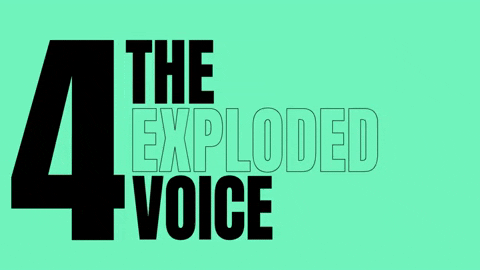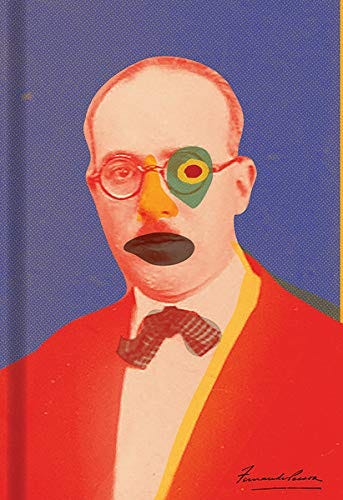The Verbal Web Part 4: The Exploded Voice
Blowing up our ideas of literary identity and authorship with some AI help
This is part 4 of a series about the future of online writing. Parts 1, 2 and 3 will help tee it up.
In late 2021, Carmen Mola won the million-euro Premio Planeta literary prize for her ground-breaking crime fiction. There was just one catch: Carmen Mola might have been doing interviews with journalists for some time, but she was actually three men writing under a Nom de Plume.
About six months later, and a month before this essay was written, the New York Times published an article partially written by journalist Steven Johnson, along with the GPT-3 AI 1.
These stories are half a year and several hemispheres apart - but both are early warning signals of a potential shift in verbal culture which is both disturbing and exciting. They hint at how new platforms and technologies could blow up some long-held ideas of how voice works in writing.
It’s often easy to believe that Literature with a capital L is immune to shifts in technology - which, in some specific ways that I will explore in future, it is - but new platforms and the ways they shape attention have always impacted the way that artists create. As Marshall McLuhan said,
“First we build the tools, then they build us.”
In music, the arrival of the vinyl record created the 3-minute pop song, the MP3 and streaming era have changed the ways that hooks land and choruses are constructed2, and TikTok put music discovery on steroids.
In film-making, the distortion of our attention spans by other media led to a remake of King Kong that was longer than the original, but where each individual shot was shorter for flightier viewers used to shorter content.
In TV, the morphing of our attentions spans led first to the box set, then the anthology format, and now shows like Love, Death and Robots designed to be consumed in bite-size chunks.
Art and creativity are reshaped by the technology and platforms they’re expressed on, and in response to the ones that they’re surrounded by. Why should writing be any different?
We don’t think about books as a technology, but they are - and one which The Lindy Effect suggests are likely to stick around for a while yet. There’s plenty of room and time for evolution. The examples of Dickens and Dumas serialising their novels to access newspaper-reading audiences are well-worn and still useful (Dhrupad Karwa refers to these as ‘Dickens Drops’ in his Litvisions Podcast, which you should all subscribe to3).
As Emma Smith observes in Approaching Shakespeare, those who view The Bard as the pinnacle of artistic endeavour often overlook the fact that he was also a savvy entrepreneur reacting to the popular genres and political backdrop of Elizabethan and Jacobean England, and the newly powerful technology of the pre-modern theatre. Writers are commercial artists and media experimenters too.
Modern writing has already been reacting to the attention economy in a number of ways: witness on one hand the resurgence and popularity of Very Long Novels like A Little Life and City on Fire and Novel Cycles like Elena Ferrante’s Neapolitan Quartet or Hilary Mantel’s Cromwell Trilogy in the wake of box-set television like The Wire.
But there are 2 particular areas where technology might explode our ideas of literature and voice in exciting and unprecedented ways.
ANONYMITY AND AI
Let’s start with the anonymity portion, and consider the modern dominance of auto-fiction in bookshops and culture.
Auto-fiction is literature reacting to social media, its habit of making us diarise and publicise our entire lives and pretend it’s the truth. Much of what we call literary fiction right now feels like thinly-veiled auto-biography, where the line where author ends and character begins has been blurred into non-existence.
There are plenty of benefits to our notions of literary voice converging with identity: not least a great deal of conversation about gender/sex/racial bias and cultural appropriation, who has the right to write whom, and many topics that have been long over-due in publishing.
It also means that there is more and more pressure for writers’ own lives to map identically onto those of their characters. It’s not uncommon for readers to search for a writer and try to establish how their life relates to what they have put on the page, and in the last few years we’ve seen the real-life fall-out of writers ripping people from reality and inserting them into fiction sans imagination.
But will the rule of ‘write what you know’ survive an era of publishing when we’re no longer even sure who’s doing the writing in the first place?
Part of the promise of Web3 is anonymity: your wallet - which unlocks much of the interaction and utility of Web3 platforms and services - doesn’t have to be linked to your identity in the way that social profiles do, and many people are already using NFT avatars as their profile pictures when showing up on Discord Servers.
Web3 allows authors to write, distribute and get paid for whatever they want to say or write, so long as they do it well enough to move, entertain, and connect with their readers - regardless of how well it fits with their own backstory or their identity. Now they can publish and get paid without revealing who they are.
To explore what this kind of anonymity could do to ideas of literary voice which culture has been shoving ever closer to the identity of the author for several years, let’s talk about this guy: Portuguese literary icon Fernando Pessoa.
In his modernist masterpiece The Book of Disquiet, Pessoa wrote an ‘unbook’ authored by one of a series of heteronyms whom he had invented and given alternative identities, backstories and voices - and whom he considered to be more real than he was. The result was a whole new form of literature4.
But Pessoa’s approach, with his multiple heteronyms and personalities, would have been put on steroids by the sort of identity-creation tools available in 2022. What would he have done if he could have created distinct wallets, social profiles and publishing platforms for each of his different characters? Yes, this would be high-end literary catfishing, and yes he would have gone mad, but it would still be brilliant to read. And anyone can do this, right now.
There are, sadly, no guarantees that this kind of literary anonymity won’t also trigger waves of terrible, insensitive and racist writing by people pretending to be from other races or cultures that they don’t understand. But anonymity might also have a freeing effect on the types of thing people believe they have permission to write about.
And then there is most interesting side of all this - the possibility that works might not be written by a human at all.
The NYT article I mentioned earlier referenced how AI is mastering language, but in reality GPT-3 is just the latest visible spearhead of AI writing tools.
There are a range of big issues around these AIs, starting with the biases baked into them, the datasets they draw from and how easily they can be prompted to generate highly-offensive content - which have been and will be discussed at greater depth elsewhere.
But if nothing else, if used right they offer a chance to expand our notions of voice and style in radical new directions, and I will be experimenting with them a fair bit.
We maybe don’t think of things like Grammarly or the autocorrects in Gmail as AI, but we also have tools like Hemingway and Sudowrite at the accessible end of spectrum. At the more extreme end, you have pioneers like Sasha Stiles mentoring an AI to write poetry5.
This sort of thing may trigger shudders of horror about the creeping encroachment of technology into one of the few areas of culture that had seemed most resistant to it.
But when writing I keep a ‘watchlist’ of tics6 - those verbal crutches and turns of phrase where personal style slides into cliché or self-parody. Wouldn’t it be nice to have an editor alive to the things you would like to keep out of that early draft? I fed parts of this essay into Sudowrite and took its rewrites gladly.
I also fed my concerns about writing this essay on Substack into GPT-3’s short horror-story generator, and this comedic interlude/sound advice was what I got.
It calls to mind the ‘Cut Up’ approach favoured by William Burroughs and the 'Verbasizer Machine’ that David Bowie used to generate lyrics. An AI that jolts you out of your habits is no more creatively inhibiting for a writer than a culture relaying the insistent message that they can only write about things that have happened to them.
AI breaks down your attachment to your own voice in a way that is cheaper, easier and less legally perilous than taking acid or other drugs generally associated with the dissolution of the ego.
It’s been an ongoing project of modernists from Virginia Woolf to David Mitchell and Marlon James - with their crowded polyphonic novels full of multiple narrators and perspectives - to destroy the notion of a singular voice as central to great literature, and AI offers the chance to explode that idea, and radically expand the style and range of writing.
Writing has always been the primary tool by which humans explore what it means to be human, and there’s perhaps no better way to do that than by testing the point where the human writer ends and the machine writer intervenes.
I’m not suggesting that this is the end of books or novels by individual authors - but the best writing always creates new genres or categories, and I look forward to a resurgence of Unidentified Flying Objects given what’s possible with AI.
Finally: perhaps the point where I’m relying on a machine to co-write my work with me is an indication that I’ve run out of steam and we’ve reached the end.
And, dear reader, we have.
Over the last 4 posts, I’ve talked about my excitement about the state of online writing and verbal culture in 2022. To recap: I hope that the new platforms and technologies available to writers help us get paid properly for our work, find like-minded communities and readers, and trigger a period of radical literary experimentation and verbal creativity.
These, I believe, are the opportunities of The Verbal Web - but but there’s no doubt plenty I’ve missed out on. What are you most excited about? What are you afraid of? What am I missing? Whatever the promises and perils of this new era, it’s open to all of us to write. If you’ve come this far with me, I look forward to reading your chapter of this story.
Thank you for reading.
EPILOGUE
So this is the end of the essay, but it’s also a form of beginning.
If this series has resembled an impassioned whinge polemic by an apprentice writer about the state of an industry he doesn’t understand, I’m also a firm believer in the adage that ‘the best way to complain is to make something’.
I don’t wish to merely spectate or commentate on this interesting era of verbal culture and writing, I’d like to contribute to it and maybe try to shape it too.
From now on, this Substack will continue to be a place to air half-done theories about whatever interest me most, but it will also be an early test lab for a series of literary experiments - some in form, some in style, and some in technology. I will be publishing short stories, AI writing, snippets of novels-in-progress and other unclassifiable verbal UFOS here in the hope that I might make some friends, improve and/or learn something along the way.
I will also be looking for collaborators, so if you’ve read this far and any of this interests you, I look forward to hearing from you.
https://www.nytimes.com/2022/04/15/magazine/ai-language.html
https://www.economist.com/finance-and-economics/2019/10/05/the-economics-of-streaming-is-changing-pop-songs
If you haven’t read this, it’s just as mind-blowing as it sounds.
https://www.sashastiles.com/technelegy
I’m quite happy to reveal them for a small fee.












On the question of bias in AI, I think we can take it as read that if ever someone developed a perfectly unbiased AI, it would be condemned for its bias by absolutely everyone. No one wants a bias-free AI. They want an AI that has their own current biases baked in.
And that is perhaps one of the more problematic limitations on AI. What are we willing to let it be?
I wrote a short story which was published all the way back in 1986 in which the first truly autonomous AI was switched on, surveyed the universe, and immediately started praising God. When asked why, it said, "For this purpose were all things made."
They immediately switched it off.
This might be the most profoundly thought-provoking thing about AI that I've ever read! So far, I've only heard dismissive or negative takes, but yours is the first essay I've encountered that actually considers AI worth getting involved in. Have you played around with any of the AI image generators? I'm getting heavily involved with them these days, so if you need any AI-made illustrations to go with your AI-made literary experiments, I would love to help!